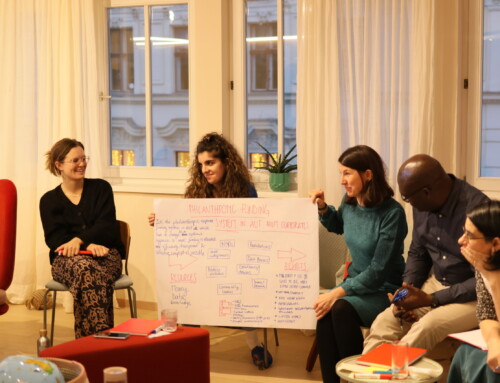Liz Hamburg from the Taproot Foundation: the global network of pro bono providers for a pupose economy

Why do more and more individuals get engaged pro bono for non-profits?
So many people are looking to find purpose outside of their daily work. Pro bono provides business professionals with opportunities to make an impact in their communities by bringing their professional skills and expertise to nonprofits and social change organizations.
Pro bono is a great way to meet new friends, expand your business network, and build your résumé or portfolio. There are many examples of skilled volunteers who have gotten new jobs, hired someone or joined a nonprofit board as a result of their pro bono work.
In Latin phrase, pro bono means “for the public good”. Unlike traditional volunteer work, pro bono service is a way for professionals to donate their expertise to a charity or NGO. So, for example, if you are a social media expert or know how to use financial spreadsheets or are an event planner, someone at an NGO would love for you to volunteer your services! Pro bono service gives NGOs a connection to talent and resources that they would otherwise not be able to access, so they can more effectively and efficiently address their missions to solve critical societal problems in fields such as health, environment or education.
But why are people looking for pupose outside their jobs in the first place? As much as people get satisfaction from their work, we hear more and more often that professionals want to find a way to get meaning outside of their day-to-day jobs. Oftentimes, this comes from giving back to their communities and making a difference. The experience is eye-opening and even life-changing for some. At Taproot, we have many cases of a professional doing pro bono service for an organization and winding up on its Board of Director or in some cases, even as part of their staff!
90% of Taproot pro bono consultants have reported that they were able to make a meaningful contribution during their service engagement
What moves companies and corporations to develop pro-bono activities? Why are they doing pro-bono? What do they expect in terms of returns (e.g. staff satisfaction, etc.)
Taproot has worked with over 60 of the Fortune 500 and other companies to design and implement customized high-impact pro bono programs for their employees. We work with companies to design pro bono programs that align with a company’s culture, brand, and strategic business objectives. It’s not one-size-fits all. Some companies are ready for programs long term, team based projects, others have employees who can only commit one day or one hour.
There are many reasons that companies want to develop pro bono programs. These range from:
- Help their community partners increase their impact by building their capacity. (community impact)
- Supporting HR objectives including recruitment, retention, teambuilding and leadership development. (HR)
- Helping to expand their network, build their brand and PR profile and demonstrate the value of their company’s core competencies. (reputation)
- Help foster a climate of innovation. As employees apply their skills in new and challenging environments, this creative approach can result in new or improved products and services. (innovation)
Many companies are looking to expand their philanthropy beyond just supporting the community with funding. They are looking to develop a three-pronged “strategic philanthropy” approach, leveraging funding, hands-on activities and pro bono service to support their community partners through all of their corporate assets.

Some Facts:
1) 89% of managers reported improvement in employees’ leadership skills after a pro bono project. Source: “Pro Bono Service: The Business Case” LBG and Associates, 2009. Commissioned by Capital One and the Taproot Foundation.
2) Pro bono service is considered a cash equivalent donation and is valued at an average of $150/hour, as compared to $23.07 for traditional volunteer activities. https://www.taprootfoundation.org/about-probono/blog/services-donated-business-professionals-are-valued-150-hour-25-increase-over-2009
3) According to a survey by HP of over 35K employees, volunteering improves employee morale more than 20%. Specifically, skills-based volunteers are 38% more likely to have the highest level of employee morale over non-volunteers. (Compared to extra-hands volunteers who are 23% more likely to have highest level of employee morale than non-volunteers.) Source: 2013 HP Global Volunteer Survey, 35,605 respondents.Measured by the number of employees who “strongly agree” with “I would recommend HP as great place to work.”
4) 90% of surveyed corporate HR professionals agree that contributing business skills/expertise to a nonprofit, in a volunteer capacity, can be an effective way to develop leadership skills. “Can Corporate Volunteering Support the Bottom Line? The Challenge. The Opportunity. The Case for Investment,” LBG Associates, The Case Foundation and Hands on Network, 2005.
What makes pro-bono really work? What are prerequisites and what are challenges?
Pro bono is not for everyone and not right for every project. We encourage NGOs and social change entrepreneurs to ask themselves a few critical question before they embark on a pro bono project:
- How big is the project scope? How well defined is it? Make sure that the project is well-articulated and has a clear deliverable and timeline.
- How urgent is the project? If there is an urgent deadline, relying on pro bono volunteers is not usually the best approach.
- What knowledge is needed? Make sure that the project doesn’t require “inside knowledge” of your organization—that this is something that a third party can bring their functional area expertise to.
- Is your staff and board ready for the project? Is this your own “pet” project or do you have buy-in from your team and from your board.
What are recommendations you would give to us in Austria to develop the pro-bono market?
At Taproot, we are building a global network of pro bono providers to share knowledge and best practices. https://www.taprootfoundation.org/about-probono/global-pro-bono
Together with our partner the BMW Foundation http://www.bmw-stiftung.de/en/what-we-do/pro-bono/
In 2014, there were 15 countries in the network. Today, there are over 30. So, pro bono is growing in popularity across the globe. Many multinational companies are developing employee engagement programs for their employees that have to be replicated across the globe. However, it’s important that each country develop their own pro bono market being aware of cultural sensitivities and practices.
A few tips:
Don’t reinvent the wheel—reach out to others who are running pro bono programs in other markets—through the Global Network, you can identify partners who are operating successful pro bono programs in Europe.
Start developing the pro bono ethic within the corporate environment. Local CSR teams can lead by example by getting their employees to do pro bono projects in addition to traditional volunteering.
In more detail:
In Austria, a good first step may be to conduct a “state of pro bono’ market study. Taproot has done many around the world to gauge the needs and readiness of the NGO field as well as corporate employee’s motivations/skills and company business drivers. The results can be the basis for providing the guidance for how to get started on the highest value/easiest to implement efforts.
Convene CSR (corporate social responsibility) leaders to discuss the role of employees in social impact efforts. Identify the ‘early adopters’ – the companies that are already involved and showcase their work.
Convene the appropriate government departments/officials who can speak to the social challenges (social affairs), as well as the business focused governmental agencies who can address the evolving corporate responsibility space (Commerce).
About Taproot
Taproot Foundation, a U.S. based nonprofit, connects nonprofits and social change organizations with skilled volunteers through pro bono service. Taproot is creating a world where organizations dedicated to social change have full access—through pro bono service—to the marketing, strategy, HR, and IT resources they need to be most effective. Since 2001, Taproot’s skilled volunteers have served 4,000 social change organizations providing 1.4 million hours of work worth over $150 million in value. Taproot is located in New York, the San Francisco Bay Area, Chicago, Los Angeles and Washington, D.C. and in partnership with the BMW Foundation, is leading a network of global pro bono providers in over 23 countries around the world.www.taprootfoundation.org





